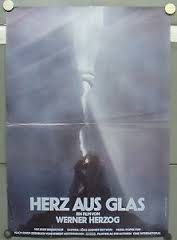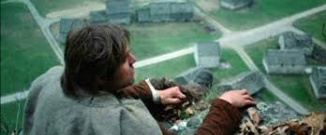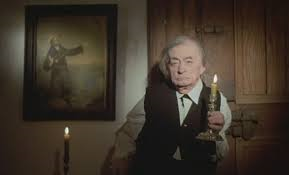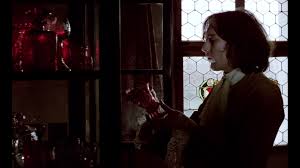Werner Herzog Season – Heart Of Glass (1976)
 No, not Blondie we’re still with the Herzog, and the next movie on the list which prefigured Debbie Harry’s crooning by a good three years. Whilst we’re just over the crest of the halfway stage of the BFI box set there is still plenty to come, and we’re back in Germany (or specifically Bavaria) for this brooding 18th century tale of magi mesmerists and sacrilegious seers. The inspiration for Heart Of Glass comes from the legends of the Bavarian prophet Muhlhiasl, something of a 18th century Nostramadus figure which every imaginative boy of Herzog’s generation was fascinated with. In this distant, misty pastoral era a quiet village falls under a strange bewitchment when the local glassblower Muhlbeck expires, taking the secret of his crimson inflected ornaments to the grave, plunging the settlement into some strange, protoplasmic psychic shock. Like any Herzog protagonist we’ve come to know and admire Hias (Joseg Bierbitcher, last seen in Haneke’s The White Ribbon) enjoys powers marking him as a curious outsider, a man attuned to mystical and spiritual matters, his predestinative vision predicting that the hamlet will be lost in a cleansing fire. His narration plays to the audience rather than the bewildered and frightened villagers, marking him as our avatar for the journey through these superstitious times, so it seems strange that he is almost completely abandoned as the film lurches through its diffused findings. The setting coincides with the romantic ruinations of Keats and Shelley, of Coleridge and Byron, their work in dynamic & diametric reaction to the industrial revolution, forged within a celebration of the elemental and mysterious forces lurking in bird, beast and stone, of the swirling maelstrom and fathomless beauty of life tossed about like a minnow in a cyclone. Its heady mix which Herzog fails to marshal or manipulate, in perhaps the first true failure of his career.
No, not Blondie we’re still with the Herzog, and the next movie on the list which prefigured Debbie Harry’s crooning by a good three years. Whilst we’re just over the crest of the halfway stage of the BFI box set there is still plenty to come, and we’re back in Germany (or specifically Bavaria) for this brooding 18th century tale of magi mesmerists and sacrilegious seers. The inspiration for Heart Of Glass comes from the legends of the Bavarian prophet Muhlhiasl, something of a 18th century Nostramadus figure which every imaginative boy of Herzog’s generation was fascinated with. In this distant, misty pastoral era a quiet village falls under a strange bewitchment when the local glassblower Muhlbeck expires, taking the secret of his crimson inflected ornaments to the grave, plunging the settlement into some strange, protoplasmic psychic shock. Like any Herzog protagonist we’ve come to know and admire Hias (Joseg Bierbitcher, last seen in Haneke’s The White Ribbon) enjoys powers marking him as a curious outsider, a man attuned to mystical and spiritual matters, his predestinative vision predicting that the hamlet will be lost in a cleansing fire. His narration plays to the audience rather than the bewildered and frightened villagers, marking him as our avatar for the journey through these superstitious times, so it seems strange that he is almost completely abandoned as the film lurches through its diffused findings. The setting coincides with the romantic ruinations of Keats and Shelley, of Coleridge and Byron, their work in dynamic & diametric reaction to the industrial revolution, forged within a celebration of the elemental and mysterious forces lurking in bird, beast and stone, of the swirling maelstrom and fathomless beauty of life tossed about like a minnow in a cyclone. Its heady mix which Herzog fails to marshal or manipulate, in perhaps the first true failure of his career.
 The film is notorious for Herzog exercising one of the stranger directorial decisions in the canon, of having the entire cast perform whilst under the influence of hypnosis. Like me you’re probably wondering why he didn’t simply instruct his performers to adopt a trancelike, somnambulist persona during the pertinent sequences, but as we know the man doesn’t cut corners in his art, and the result is quite an affecting affliction with scenes twisted in odd tonal entanglements, with figures and characters locked in a veneer of inscrutable illegibility. The entire film is draped with a half-conscious, dream like quality, but the form needs to marry the content, as impressions emerge of an amorphous blob which is bereft of purpose or purchase. I’m far from being any art historian but you can’t help but notice the trappings of Rembrandt and Vermeer in the interiors and staging, a naturalistic approach to finding the light and shading on set, flooding the saturated interiors with the fleeting ephemera of 18t century life. Herzog confirms these instincts in the commentary and confirms his patience in sometimes waiting hours for the right axis of light in the sky, rather than artificially simulate effects with lense gels and filters, or post-production colour timing or negative baths. He’s also a bit harsh on storyboarding which he describes as a ‘disease of filmmaking’, the preplanning of fools obliterating the instinctive nature of crafting images and stories, but let’s not get distracted down that particular rabbit hole…..yet.
The film is notorious for Herzog exercising one of the stranger directorial decisions in the canon, of having the entire cast perform whilst under the influence of hypnosis. Like me you’re probably wondering why he didn’t simply instruct his performers to adopt a trancelike, somnambulist persona during the pertinent sequences, but as we know the man doesn’t cut corners in his art, and the result is quite an affecting affliction with scenes twisted in odd tonal entanglements, with figures and characters locked in a veneer of inscrutable illegibility. The entire film is draped with a half-conscious, dream like quality, but the form needs to marry the content, as impressions emerge of an amorphous blob which is bereft of purpose or purchase. I’m far from being any art historian but you can’t help but notice the trappings of Rembrandt and Vermeer in the interiors and staging, a naturalistic approach to finding the light and shading on set, flooding the saturated interiors with the fleeting ephemera of 18t century life. Herzog confirms these instincts in the commentary and confirms his patience in sometimes waiting hours for the right axis of light in the sky, rather than artificially simulate effects with lense gels and filters, or post-production colour timing or negative baths. He’s also a bit harsh on storyboarding which he describes as a ‘disease of filmmaking’, the preplanning of fools obliterating the instinctive nature of crafting images and stories, but let’s not get distracted down that particular rabbit hole…..yet.
 78This is only the second time (or the third if you count the commentary track) I’ve seen Heart Of Glass and I must confess to finding it somewhat impenetrable. Yes, the atmosphere is rich and sumptuous but there is no drama here, no real sense of direction or flow, and the elemental mysteries the films provokes such as the source, purpose and resolution of the villages ailment is almost wilfully eschewed. If you read it as some romantic movement attuned mood piece then I think you’re in a good area, as it doesn’t remotely dwell on dramatic events or build tangible characters as much as it scurries about for some intangible tendrils, a plot infected with portentous preaching. The first half hour merges some stunning landscapes, sounds and a curious sense of ethereal wonder, but then it just gets lost in the woods, the fairy tale breadcrumbs devoured by Herzog’s diffused sense of drama and meaning. We’ve barely scratched the surface of Herzog’s famous phrase of his to describe his work, his eternal yearning for the ecstatic truth in his cinema, and while his cinema can realise some profound truths when the story, image and sound come together it can also lurch into the dark recess of pretention which I fear is the case here.
78This is only the second time (or the third if you count the commentary track) I’ve seen Heart Of Glass and I must confess to finding it somewhat impenetrable. Yes, the atmosphere is rich and sumptuous but there is no drama here, no real sense of direction or flow, and the elemental mysteries the films provokes such as the source, purpose and resolution of the villages ailment is almost wilfully eschewed. If you read it as some romantic movement attuned mood piece then I think you’re in a good area, as it doesn’t remotely dwell on dramatic events or build tangible characters as much as it scurries about for some intangible tendrils, a plot infected with portentous preaching. The first half hour merges some stunning landscapes, sounds and a curious sense of ethereal wonder, but then it just gets lost in the woods, the fairy tale breadcrumbs devoured by Herzog’s diffused sense of drama and meaning. We’ve barely scratched the surface of Herzog’s famous phrase of his to describe his work, his eternal yearning for the ecstatic truth in his cinema, and while his cinema can realise some profound truths when the story, image and sound come together it can also lurch into the dark recess of pretention which I fear is the case here.
 I’m all for a sense of mystery, for an ambulant alchemy in my movies but Heart Of Glass is just to diffused and distracted for my taste, or at least my muddled mindset when I revisited this last week. But all is not completely lost as the final scene just about salvages the entire ship, with a odd bookmark which suggest that the entire architecture of the film was erected for this coda. To the strains of the eerie Popul Vuh soundscape the film moves from the interior to an exterior, as if the preceding 70 minutes were mounting a futile expedition to map the contours of consciousness within the brain, before arriving at the metaphoric nodal point of Skellig Rock. This is an inhospitable spot where over the centuries the Vikings threw through their foes to a watery sacrifice, and where a monkish community established itself remote from the trappings of material society. As the tale ruminates on a holy seer who slowly over years of dutiful penitence attracts a small coterie of followers, finally embarking on a forlorn sailboat journey to conquer the horizon, to find purpose in the face of a silent and implacable diety. This is either a nihilist conclusion, brimming with desolation for some, for others it is a celebration of our constant striving for meaning, a resilience in the shadow of oblivion – make your own mind up here;
I’m all for a sense of mystery, for an ambulant alchemy in my movies but Heart Of Glass is just to diffused and distracted for my taste, or at least my muddled mindset when I revisited this last week. But all is not completely lost as the final scene just about salvages the entire ship, with a odd bookmark which suggest that the entire architecture of the film was erected for this coda. To the strains of the eerie Popul Vuh soundscape the film moves from the interior to an exterior, as if the preceding 70 minutes were mounting a futile expedition to map the contours of consciousness within the brain, before arriving at the metaphoric nodal point of Skellig Rock. This is an inhospitable spot where over the centuries the Vikings threw through their foes to a watery sacrifice, and where a monkish community established itself remote from the trappings of material society. As the tale ruminates on a holy seer who slowly over years of dutiful penitence attracts a small coterie of followers, finally embarking on a forlorn sailboat journey to conquer the horizon, to find purpose in the face of a silent and implacable diety. This is either a nihilist conclusion, brimming with desolation for some, for others it is a celebration of our constant striving for meaning, a resilience in the shadow of oblivion – make your own mind up here;

Leave a comment